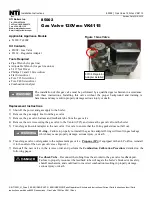
7.0 Site Requirements
18
© Baxi Heating UK Ltd 2014
7.6
Condensate Drain
FAILURE TO INSTALL THE CONDENSATE
DISCHARGE PIPEWORK CORRECTLY WILL AFFECT
THE RELIABLE OPERATION OF THE BOILER.
CAREFUL CONSIDERATION MUST BE GIVEN TO THE
POSSIBILITY OF THE PIPEWORK BEING SUBJECT TO
FREEZING CONDITIONS AND APPROPRIATE
MEASURES TAKEN TO PREVENT BLOCKAGE.
CORRECT INSTALLATION IN ACCORDANCE WITH
THIS SECTION WILL CONSIDERABLY MINIMISE THE
LIKELIHOOD OF BLOCKAGE AND SUBSEQUENT
BOILER LOCK-OUT.
A CONDENSATE DISCHARGE PUMP AND PIPE ‘TRACE
HEATING’ ARE AVAILABLE AS ACCESSORIES - see
paragraphs 7.7.12 to 7.715 for further details.
The condensate discharge pipe MUST NOT RISE at any
point along its length. There MUST be a fall of AT LEAST
2.5° (50mm per metre) along the entire run EXCEPT
when employing a suitable condensate pump in basement
and cellar or similar applications.
The boiler condensate trap incorporates a seal of 75mm,
therefore it is unnecessary to install an air break and trap
in the discharge pipework.
1. The condensate outlet will accept 21.5mm (
3
/
4
in) plastic
overflow pipe.
It is strongly recommended that this
discharges internally into the household drainage system
.
Where this is not possible, discharge into an outside drain is
permissible providing every possible precaution is taken to
prevent freezing.
2. Ensure the discharge of condensate complies with any
national or local regulations in force.
BS 6798 & Part H1 of
the Building Regulations give further detailed guidance.
3. The discharge pipe should be run in a proprietary drain pipe
material e.g. PVC, PVC-U, ABS, PVC-C or PP.
4. Metal pipework is NOT suitable for use in condensate
discharge systems.
5. The pipe should be a minimum of 21.5mm diameter and
must be supported using suitably spaced clips of the correct
design to prevent sagging.
6.
It is advisable that the full length of condensate pipe is run
internally and preferably be less than 3 metres.
7.
Internal runs greater than 3 metres or runs in cold areas
should use 32mm waste pipe.
8.
External runs MUST be a MINIMUM of 32mm and fully
insulated with material suitable for external use.
9. If the boiler is fitted in an unheated location the entire
condensate discharge pipe should be treated as an external
run and sized and insulated accordingly.
10. In all cases discharge pipe must be installed to aid disposal
of the condensate. To reduce the risk of condensate being
trapped, as few bends and fittings as possible should be used
and any burrs on cut pipe removed.
21.5mm
2.5° Minimum fall
i) Termination to an internal soil and
vent pipe
450mm min*
Boiler
2.5° Minimum fall
ii) External termination via internal discharge branch
e.g sink waste - downstream*
Sink
Pipe must terminate above
water level but below
surrounding surface. Cut
end at 45°
50mm per metre of pipe run
50mm per metre of pipe run
*450mm is applicable to
properties up to 3 storeys.
For multi-storey building
installations consult BS 6798.
Examples are shown of the following methods of termination:-
i) to an internal soil & vent pipe
ii) via an internal discharge branch (e.g. sink waste) downstream of the trap
iii) to a drain or gully
iv) to a purpose made soakaway
v) pumped into an internal discharge branch (e.g. sink waste) downstream of the trap
vi) pumped into an external soil & vent pipe
vii) to a drain or gully with extended external run & trace heating
It is strongly recommended to discharge internally into the household
drainage system. If connecting to a rain water drain, that drain MUST
discharge into a foul drain.
*It is NOT RECOMMENDED
to connect upstream of the
sink or other waste water
receptacle !
32mm
Insulation
















































